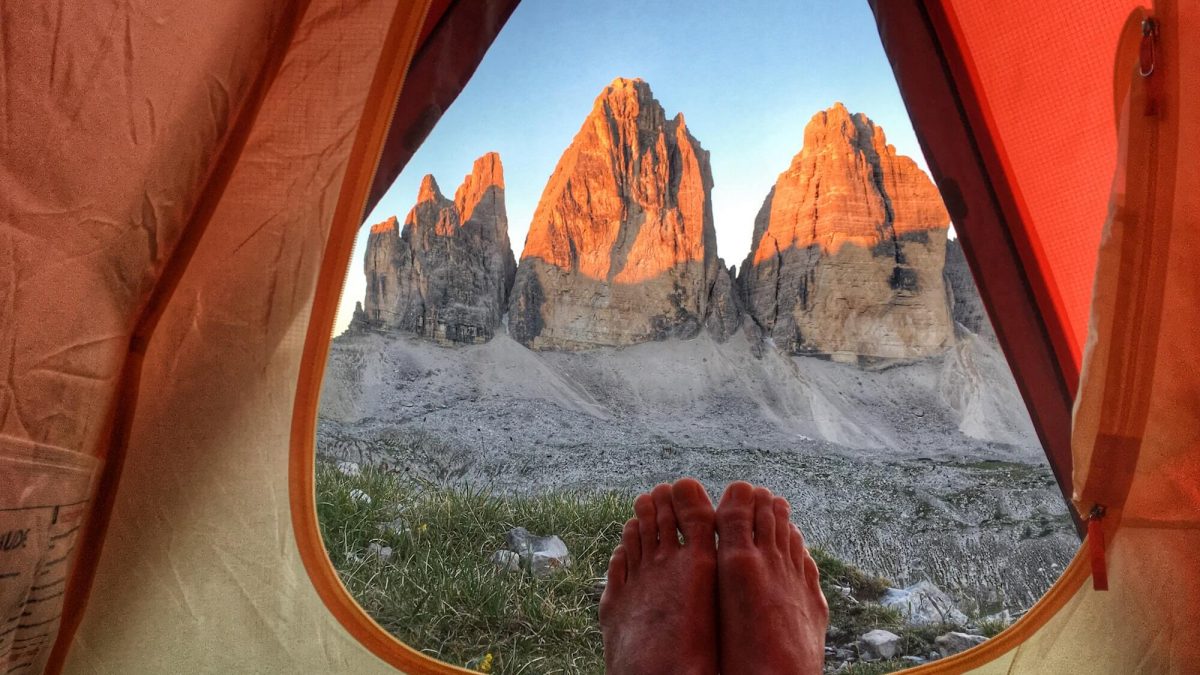Sleep Outside
{A Written Practice}
Sleep Outside
And then you get to wake up outside!
NOTE: I will acknowledge first the privilege in considering this as a practice, because there are many people who are unsheltered, around the world for various reasons. Most of them probably aren't using this website. And it's important to acknowledge here that what we are speaking about is sleeping outside by choice, in someplace that feels safe to you.
The strange thing about this is how many modern people don't ever do it. We know so many modern people who don't like to sleep outside. I find this fascinating for several reasons. One is that our entire evolutionary history involves sleeping outside. For the first 1.99 million years of our evolutionary history, even our indoor spaces were still outside, because we hadn't developed sufficient materials technology to seal them off. Our ancestors in the Kalahari lived in thatched huts. Consider this in light of the fact that there are lions in the Kalahari. For many years, when I went camping, I slept in a tent. On a number of occasions I've awakened in the middle of the night and become aware of some creature around the tent. Lying there, in the darkness, the flimsiness of the tent is the thing I used to find myself most aware of. A bear can peel the door off a car, so if it's hungry enough, the tent is is basically just a wrapper on the burrito that is me. I'm being tongue in cheek here. Most bears (unless starving) don't want to have anything to do with you. Your food, however, they'd like to have plenty to do with.
This aspect of feeling vulnerable sleeping outside I understand, and it should give us compassion for anyone who is unsheltered. Having a sturdy shelter provides safety, the necessary pre-requisite for accessing connection. Another facet of this, for folks who haven't spent a good deal of time outdoors, is that you become very sensitive to all the unfamiliar sounds. Many is the time I've been grabbed in the middle of the night, in a tent, by my wife whispering, What is that noise? She doesn't like it when I say I don't know, then roll over and go back to sleep.
Sleeping outdoors you'll discover that your sense of hearing definitely sharpens. You will hear creatures. I think its interesting that often, based on the sound, you'll think there is an immense creature near you, and it will turn out to be quite modest. We've had a few nights where the bears turned out to be skunks.
Speaking of skunks, I once had an interesting encounter with one of these creatures. This was before I began sleeping in hammocks, as they do in Brasil. This was about five years ago, at the time I had figured out that I didn't like sleeping in tents, but before the hammock routine was in place. I was in the mountains near Santa Cruz, California, deep in a redwood forest, sleeping on a tarp on the ground. In the middle of the night, I heard a creature step on to the tarp. This was quite loud. It was a plastic tarp, and it made a crackling sound near my ear. The tarp extended about three feet in every direction beyond my sleeping bag. There was no moon. I was suddenly wide awake, my heart pounding in my chest. I couldn't see anything. I was sleeping on my belly and slowly lifted my head up. It was walking toward me. And then, I saw only a white stripe, passing just beneath my nose. My breath must have been warm on her back. I didn't move a muscle. She passed across the tarp, just inches from my face, and went off about her business.
With regard to sleeping outside, the Brasilians have it figured out, and I recommend we adopt their approach. With regard to alot of the things (politics definitively excepted) the Brasilians have it figured out (e.g., a culture of incredible human warmth, and a ventral vagal language if ever there was one.) A brasilian hammock (rede- or net) has no cross-piece, and you lie in it diagonally. Sleeping outside in a hammock solves a fundamental problem, the benign version of which is illustrated by my skunk story (through that could have ended differently). The less benign version of it is that if you are on the ground, sleeping outside, that's also where the spiders, snakes, and other creepy crawlies are. In a hammock, you are less likely to intercept a stinging or biting creature aside from a mosquito.
In order to actually enjoy sleeping outside, you have to recalibrate and down-regulate your threat response. Our exaggerated startle reflex to noises in the night represents a state of increased vigilance, and for many people the difficulty with sleeping outside is that we don't sleep well, because we can't relax. This is a useful problem, through the lens of restorative practice, because it points to a capacity many of us need to develop, distinguishing between discomfort and actual danger (White folk– I'm talking to us). The next time you read The New York Times, look through the obituary section and circle all of the deaths that involved being eaten by a creature while camping. You haven't uncapped your pen, have you? Of course not. This doesn't happen. Well, actually, I have heard a couple stories about Americans on safari, and about Americans in Australia...why does it always have to be Americans? But generally these folks were doing something exceedingly foolish. My point here is that for most of us sleeping outside is not dangerous, but our nervous system responds as if it were so. This is faulty neuroception due to unfamiliarity. In most parts of the world what is dangerous out in nature is another person. Not a creature. The reason camping then becomes a good neural exercise is because in order to rest, you have to coax your body into a state of relaxation. Hazard awareness–knowing what is actually dangerous in an environment–is a foundational nature awareness practice, and doing this research can actually help you relax. Where we live in Northern California, environmental dangers consist of scorpions, black widow spiders, rattlesnakes, ticks, and what is commonly known as Poison Oak (we invite you to call it Guardian Oak instead.) If you know what each of these dangers is, and where they are likely to be, it is easier to relax. When we don't know the environmental hazards, we are more likely to be vigilant. This is simply nature street-smarts. You gotta know who lives in the neighborhood, and where they are likely to be. The reason I roll over and go back to sleep is because I've catalogued the possible dangers. If my wife wakes me up and the sound is a rattling sound, I'm not going back to sleep because that is the sound of a creature on my hazard list. Nor would I probably go back to sleep if I heard something growling, because although coyotes, bobcats, and mountain lions are unlikely to attack me, I'm in their neighborhood, not the other way around. Extending this a little deeper, if I hear a bird alarm (see bird language I'm also not likely to fall back asleep, but this is rare in my experience. I actually find myself more vigilant if I hear other humans unknown to me in nature at night. That tends to be the thing that makes me most nervous.
Related Practices:
Sleeping outside positions you well to Stargaze, watch the Phases of the Moon, and catch the Sunrise. When you spend time outdoors, it's also good to speak the language of the living world, otherwise known as Bird Language. In a forest where you are the only person, you are also the only creature who doesn't speak bird language. You might find Tracking relevant, as well as Sit Spot, Campfires and Learning to Make Fire.Photography: | Licensed from Pexels.com, used with permission.


